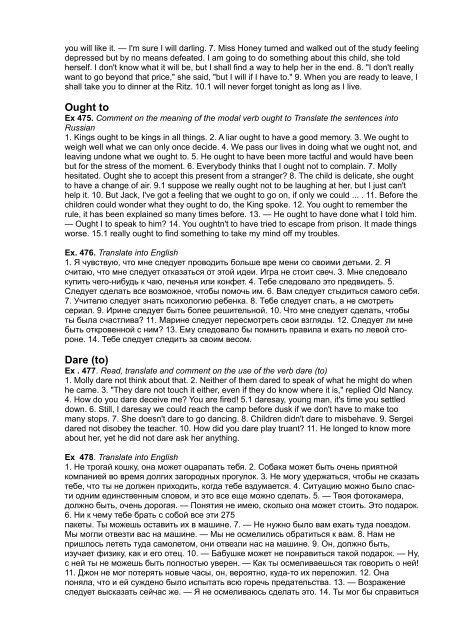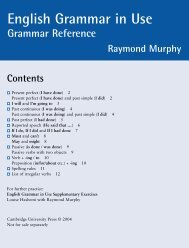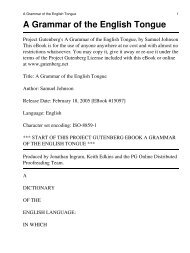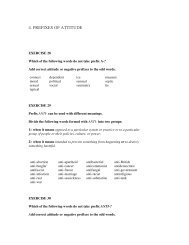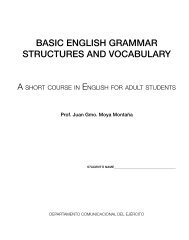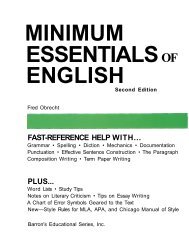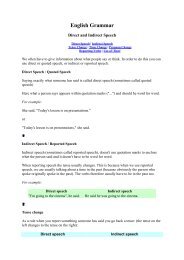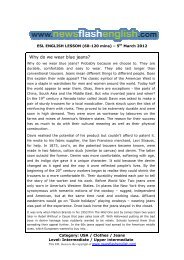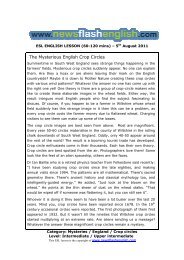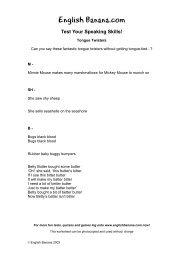Exercises in Modern English Grammar - ESL Teachers Board
Exercises in Modern English Grammar - ESL Teachers Board
Exercises in Modern English Grammar - ESL Teachers Board
You also want an ePaper? Increase the reach of your titles
YUMPU automatically turns print PDFs into web optimized ePapers that Google loves.
you will like it. — I'm sure I will darl<strong>in</strong>g. 7. Miss Honey turned and walked out of the study feel<strong>in</strong>g<br />
depressed but by no means defeated. I am go<strong>in</strong>g to do someth<strong>in</strong>g about this child, she told<br />
herself. I don't know what it will be, but I shall f<strong>in</strong>d a way to help her <strong>in</strong> the end. 8. "I don't really<br />
want to go beyond that price," she said, "but I will if I have to." 9. When you are ready to leave, I<br />
shall take you to d<strong>in</strong>ner at the Ritz. 10.1 will never forget tonight as long as I live.<br />
Ought to<br />
Ex 475. Comment on the mean<strong>in</strong>g of the modal verb ought to Translate the sentences <strong>in</strong>to<br />
Russian<br />
1. K<strong>in</strong>gs ought to be k<strong>in</strong>gs <strong>in</strong> all th<strong>in</strong>gs. 2. A liar ought to have a good memory. 3. We ought to<br />
weigh well what we can only once decide. 4. We pass our lives <strong>in</strong> do<strong>in</strong>g what we ought not, and<br />
leav<strong>in</strong>g undone what we ought to. 5. He ought to have been more tactful and would have been<br />
but for the stress of the moment. 6. Everybody th<strong>in</strong>ks that I ought not to compla<strong>in</strong>. 7. Molly<br />
hesitated. Ought she to accept this present from a stranger? 8. The child is delicate, she ought<br />
to have a change of air. 9.1 suppose we really ought not to be laugh<strong>in</strong>g at her, but I just can't<br />
help it. 10. But Jack, I've got a feel<strong>in</strong>g that we ought to go on, if only we could ... . 11. Before the<br />
children could wonder what they ought to do, the K<strong>in</strong>g spoke. 12. You ought to remember the<br />
rule, it has been expla<strong>in</strong>ed so many times before. 13. — He ought to have done what I told him.<br />
— Ought I to speak to him? 14. You oughtn't to have tried to escape from prison. It made th<strong>in</strong>gs<br />
worse. 15.1 really ought to f<strong>in</strong>d someth<strong>in</strong>g to take my m<strong>in</strong>d off my troubles.<br />
Ex. 476. Translate <strong>in</strong>to <strong>English</strong><br />
1. Я чувствую, что мне следует проводить больше вре мени со своими детьми. 2. Я<br />
считаю, что мне следует отказаться от этой идеи. Игра не стоит свеч. 3. Мне следовало<br />
купить чего-нибудь к чаю, печенья или конфет. 4. Тебе следовало это предвидеть. 5.<br />
Следует сделать все возможное, чтобы помочь им. 6. Вам следует стыдиться самого себя.<br />
7. Учителю следует знать психологию ребенка. 8. Тебе следует спать, а не смотреть<br />
сериал. 9. Ирине следует быть более решительной. 10. Что мне следует сделать, чтобы<br />
ты была счастлива? 11. Марине следует пересмотреть свои взгляды. 12. Следует ли мне<br />
быть откровенной с ним? 13. Ему следовало бы помнить правила и ехать по левой стороне.<br />
14. Тебе следует следить за своим весом.<br />
Dare (to)<br />
Ex . 477. Read, translate and comment on the use of the verb dare (to)<br />
1. Molly dare not th<strong>in</strong>k about that. 2. Neither of them dared to speak of what he might do when<br />
he came. 3. "They dare not touch it either, even if they do know where it is," replied Old Nancy.<br />
4. How do you dare deceive me? You are fired! 5.1 daresay, young man, it's time you settled<br />
down. 6. Still, I daresay we could reach the camp before dusk if we don't have to make too<br />
many stops. 7. She doesn't dare to go danc<strong>in</strong>g. 8. Children didn't dare to misbehave. 9. Sergei<br />
dared not disobey the teacher. 10. How did you dare play truant? 11. He longed to know more<br />
about her, yet he did not dare ask her anyth<strong>in</strong>g.<br />
Ex 478. Translate <strong>in</strong>to <strong>English</strong><br />
1. He трогай кошку, она может оцарапать тебя. 2. Собака может быть очень приятной<br />
компанией во время долгих загородных прогулок. 3. Не могу удержаться, чтобы не сказать<br />
тебе, что ты не должен приходить, когда тебе вздумается. 4. Ситуацию можно было спасти<br />
одним единственным словом, и это все еще можно сделать. 5. — Твоя фотокамера,<br />
должно быть, очень дорогая. — Понятия не имею, сколько она может стоить. Это подарок.<br />
6. Ни к чему тебе брать с собой все эти 275<br />
пакеты. Ты можешь оставить их в машине. 7. — Не нужно было вам ехать туда поездом.<br />
Мы могли отвезти вас на машине. — Мы не осмелились обратиться к вам. 8. Нам не<br />
пришлось лететь туда самолетом, они отвезли нас на машине. 9. Он, должно быть,<br />
изучает физику, как и его отец. 10. — Бабушке может не понравиться такой подарок. — Ну,<br />
с ней ты не можешь быть полностью уверен. — Как ты осмеливаешься так говорить о ней!<br />
11. Джон не мог потерять новые часы, он, вероятно, куда-то их переложил. 12. Она<br />
поняла, что и ей суждено было испытать всю горечь предательства. 13. — Возражение<br />
следует высказать сейчас же. — Я не осмеливаюсь сделать это. 14. Ты мог бы справиться


